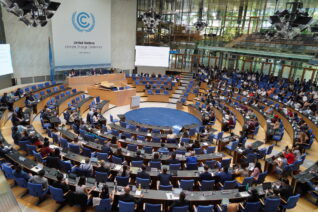COP28 Lead-Up Negotiations Plagued by Disagreements
Diplomatic talks in Bonn faced big challenges over climate finance and other issues.
The COPs (Conferences of Parties), held annually by the United Nations Framework Convention on Climate Change (UNFCCC), are undeniably the biggest moments for international climate policy and diplomacy. However, while the COPs provide the venue for formal agreements, it is the less headline-hitting negotiations that happen in the months in between that lay the vital groundwork to improve the COPs’ chances of success.
In June 2023, diplomats met in Bonn, Germany, to prepare ahead of COP28, which will be held in Dubai, United Arab Emirates (UAE), less than six months later. Such talks are often seen as the ‘midway point’ between COPs and can provide a gauge of the likelihood of positive outcomes at the COPs themselves. In the case of Bonn 2023, this gauge was unpromising: the negotiations were plagued by a number of deep disagreements that threatened to derail discussions completely.

United Nations Climate Change Conference, Bonn, Germany, June 2023. Image by UNclimatechange: https://www.flickr.com/photos/unfccc/52955595913/ Sourced 28 June 2023
Climate finance
International politics are often troubled by a simple but fundamental question: who pays? In the context of climate change, there is a strong argument that developed nations – those who have benefited most from the combustion of fossil fuels – should pay to support climate mitigation and adaptation efforts made by developing nations. Despite not being a main agenda item, this question loomed large across Bonn talks.
Previous COPs have agreed that developed nations will help finance developing nations, but a key target – for developed nations to provide $100bn by 2020 – was missed. This has inevitably damaged trust among parties, and there are ongoing arguments over where the money should come from, the quantity needed, and the many detailed logistics involved in transferring and using it effectively. It has been suggested that the world’s financial systems will need systemic change to make sure future promises are kept. At Bonn, delegates found that making progress on any issue was made extremely challenging by the remaining gaps and disagreements surrounding climate finance.
Phase out
Another major point of contention was COP28’s anticipated overall vision: in particular, whether to focus on phasing out fossil fuels, or rather phasing out their emissions. The difference may not be immediately obvious, but is actually profound. Phasing out fossil fuels themselves would herald a transition to renewable energy, whereas phasing out emissions would lead to more efficient means of combustion of existing fossil fuels, but continuing to rely on fossil fuels to provide energy.
The UAE, host of COP28, is famously one of the world’s largest oil producers, so it is unsurprising that they are more in favour of phasing out emissions, while keeping fossil fuels in the mix. Many Western nations and climate-vulnerable island states strongly disagree, saying this approach could fatally stall progress on transitioning to a net-zero society. This ties in to major concerns about the COP presidency: the UAE’s president-designate is Sultan Al Jaber, Chief Executive of the UAE’s national oil company, ADNOC. Many have argued that the negotiations are at severe risk of being undermined, if they are headed by someone with such a strong vested interest in the ongoing reliance on fossil fuels.
Bonn outcomes
These disagreements, among others, led to severe delays at Bonn, with the starting agenda itself only agreed upon the day before the negotiations were due to close. While many despaired, there are still opportunities to reach common ground before COP28 kicks off. For instance, work is underway to create a ‘new global financing pact’ between developing and developed nations, and other smaller negotiations within the UN and elsewhere provide chances to close gaps.
COP28 will be the first ‘global stocktake’: a close look at how each nation is performing against its previously agreed climate goals, with the aim of then ratcheting up ambitions. Global progress is severely behind schedule, but there is hope that such a stocktake will provide leverage to push nations towards stronger commitments, matched by real progress. While Bonn was a deeply unsatisfactory experience, it at least highlighted the biggest issues that need addressing. With luck, this will provide the stimulation needed for diplomats to pour their energy into finding resolutions that help us work towards a net-zero future.
Sources
- Carbon Brief: Bonn climate talks: Key outcomes from the June 2023 UN climate conference. Published 16 June 2023
- Reuters: UN climate body head dissatisfied with Bonn climate talks outcome. Published 16 June 2023
- CNBC: Cash and carbon cuts stall UN climate talks — setting the stage for a ‘huge fight’ at COP28. Published 16 June 2023
About the Author: Jacob Ashton
POPULAR
COMMENTS
- The risk with the path to a hothouse Earth | Climate State on Climate Tipping Points Existential Threat to Our Life Support Systems
- Robert Schreib on Electricity generation prices may increase by as much as 50% if only based on coal and gas
- Robert Schreib on China made a historic commitment to reduce its emissions of greenhouse gases
- Lee Nikki on COP30: Climate Summit 2025 – Intro Climate Action Event
- Hollie Bailey on Leaders doubled down on fossil fuels after promising to reduce climate pollution